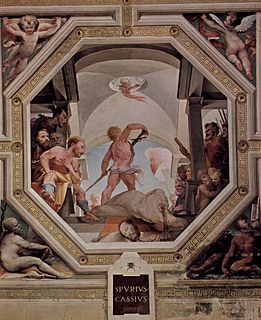Related Research Articles

Year 486 BC was a year of the pre-Julian Roman calendar. At the time,it was known as the Year of the Consulship of Viscellinus and Rutilus. The denomination 486 BC for this year has been used since the early medieval period,when the Anno Domini calendar era became the prevalent method in Europe for naming years.

Spurius Cassius Vecellinus or Vicellinus was one of the most distinguished men of the early Roman Republic. He was three times consul,and celebrated two triumphs. He was the first magister equitum,and the author of the first agrarian law. The year following his last consulship,he was accused of aiming at regal power,and was put to death by the patricians.
Agrarian laws were laws among the Romans regulating the division of the public lands,or ager publicus. In its broader definition,it can also refer to the agricultural laws relating to peasants and husbandmen,or to the general farming class of people of any society.
Land reform in the Roman republic was a system first attempted in the Roman Republic in 486 BC under the consulships of Spurius Cassius Vecellinus,and Proculus Verginius Tricostus Rutilus.
The gens Verginia or Virginia was a prominent family at ancient Rome,which from an early period was divided into patrician and plebeian branches. The gens was of great antiquity,and frequently filled the highest honors of the state during the early years of the Republic. The first of the family who obtained the consulship was Opiter Verginius Tricostus in 502 BC,the seventh year of the Republic. The plebeian members of the family were also numbered amongst the early tribunes of the people.
Postumus Cominius Auruncus was a two-time consul of the early Roman Republic.
Opiter Verginius Tricostus Esquilinus is the reconstructed name of the consul suffectus who replaced Gaius Servilius Structus Ahala as consul of the Roman Republic in 478 BC. The fact of Servilius' death is not recorded by Livy,nor by Dionysius of Halicarnassus. However the Fasti Capitolini states that Servilius died in office and was replaced by a man most of whose name is obliterated except for the cognomen "Esquilinus".
Caeso Fabius Vibulanus was consul of the Roman republic in 484,481,and 479 BC. He had earlier held the office of quaestor parricidii in 485 BC in connection with the trial and execution of Spurius Cassius Vecellinus.
Proculus Verginius Tricostus Rutilus was a Roman statesman who served as Consul.
Titus Verginius Tricostus Caeliomontanus was a Roman statesman who served as Consul in 496 BC. He is probably the (older) brother of Aulus Verginius Tricostus Caeliomontanus,consul in 494 BC.
Aulus Verginius Tricostus Caeliomontanus was a Roman Republican politician and general of the gens Verginia. He served as a Roman consul in 494 BC together with Titus Veturius Geminus Cicurinus.
Vopiscus Julius Iullus was a Roman statesman,who held the consulship in 473 BC,a year in which the authority of the Roman magistrates was threatened after the murder of a tribune of the plebs.
Titus Verginius Tricostus Rutilus,was consul of the Roman Republic in 479 BC. He held the office with Caeso Fabius Vibulanus.
Titus Veturius Geminus Cicurinus was a Roman politician of the 5th century BC,consul in 462 BC and maybe decemvir in 451 BC.
The gens Nautia was an old patrician family at ancient Rome. The first of the gens to obtain the consulship was Spurius Nautius Rutilus in 488 BC,and from then until the Samnite Wars the Nautii regularly filled the highest offices of the Roman Republic. After that time,the Nautii all but disappear from the record,appearing only in a handful of inscriptions,mostly from Rome and Latium. A few Nautii occur in imperial times,including a number who appear to have been freedmen,and in the provinces.
Aulus Verginius Tricostus Caeliomontanus was a Roman politician active in the fifth century BC and was consul in 469 BC.
Publius Servilius Priscus was a Roman senator active in the fifth century BC and consul in 463 BC.
Lucius Lucretius Tricipitinus was a Roman senator in the fifth century BC,and was consul with Titus Veturius Geminus Cicurinus in 462 BC.
Titus Verginius Tricostus Caeliomontanus was consul of the Roman Republic in 448 BC with Lars Herminius Aquilinus. Little is known about his life.
Proculus Verginius Tricostus was a consul of the Roman Republic in 435 BC. He was possibly re-elected as consul in 434 BC.
References
- ↑ Robert Maxwell Ogilvie, Commentary on Livy, books 1–5, Oxford, Clarendon Press, 1965, pp. 404, 405.
- ↑ Alan Edouard Samuel (1972). Greek and Roman Chronology: Calendars and Years in Classical Antiquity. C.H.Beck. pp. 256–. ISBN 978-3-406-03348-3.
- ↑ Titus Livius, Ab Urbe Condita , ii. 17.
- ↑ Dionysius of Halicarnassus, Romaike Archaiologia, v. 49.
- ↑ T. Robert S. Broughton, The Magistrates of the Roman Republic (1952).
- ↑ Johann Georg Baiter; Carlo Fèa (1837). Fasti consulares triumphalesque romanorum. Typis Orellii, Fuesslini et soc. pp. 231–.
- ↑ Festus 180 L
- ↑ Valerius Maximus, vi, 6.3.2
- ↑ Broughton, vol i, pp.21